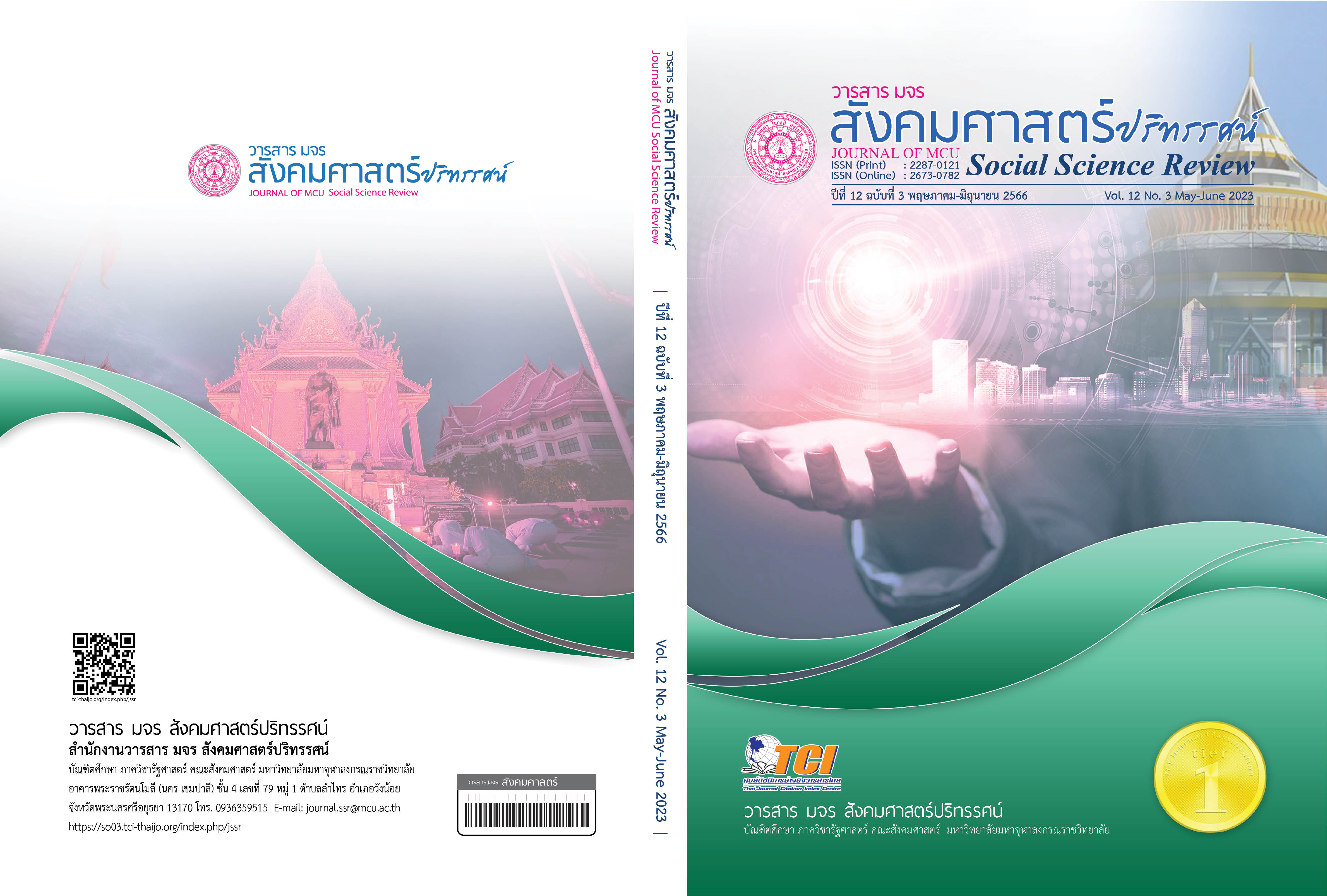ประสิทธิภาพการบริหารจัดการโครงการบรรพชาสามเณรภาคฤดูร้อนในจังหวัดกาญจนบุรี
คำสำคัญ:
ประสิทธิผล, การบริหารจัดการ, การบรรพชาสามเณรภาคฤดูร้อนบทคัดย่อ
วัตถุประสงค์ของงานวิจัยนี้เพื่อศึกษาประสิทธิผลของการบริหารจัดการโครงการพรรพชาสามเณรภาคฤดูร้อนในจังหวัดกาญจนบุรี ศึกษาปัจจัยที่ส่งผลต่อประสิทธิผลและแนวทางที่เหมาะสมสำหรับประสิทธิผลของการบริหารจัดการโครงการบรรพชาสามเณรภาคฤดูร้อนในจังหวัดกาญจนบุรี ด้วยการวิจัยแบบผสานวิธี การวิจัยเชิงปริมาณเก็บข้อมูลจากกลุ่มตัวอย่าง 400 คนจาก 4 อำเภอใจจังหวัดกาญจนบุรีด้วยแบบสอบถามวิเคราะห์ข้อมูลด้วยสถิติพรรณนาและสถิติอ้างอิง ส่วนการวิจัยเชิงคุณภาพ เก็บข้อมูลจากผู้ให้ข้อมูลสำคัญ 20 รูปหรือคนที่เกี่ยวข้องกับโครงการบรรพชาสามเณรภาคฤดูร้อนและจากผู้มีส่วนร่วมในการสนทนากลุ่มเฉพาะ 10 รูปหรือคน วิเคราะห์ข้อมูลด้วยการพรรณนาความ
ผลวิจัยพบว่า ประสิทธิผลของการบริหารจัดการโครงการบรรพชาสามเณรภาคฤดูร้อนในจังหวัดกาญจนบุรีโดยภาพรวมอยู่ในระดับมาก ได้แก่ด้านความพึงพอใจของผู้เข้าร่วมโครงการ ความพร้อมของทรัพยากร ปริมาณและคุณภาพของผู้เข้าร่วมโครงการ ทั้งหมด อยู่ในระดับมาก ส่วนปัจจัยที่ส่งผลต่อประสิทธิผลของการบริหารจัดการโครงการบรรพชาสามเณรภาคฤดูร้อนในจังหวัดกาญจนบุรี ได้แก่วิถีชีวิตแนวพุทธ ต้องการฝึกอบรมตนเองให้เป็นคนดี โครงการของชาวพุทธและของรัฐ ต้องการที่จะตอบแทนบุญคุณบิดามารดาและพระพุทธศาสนา ได้รับเกียรติและการยกย่องในชุมชนและสังคม โดยรวมมีค่าเฉลี่ยในระดับสูงที่ 4.05 ส่วนแนวทางสำหรับพัฒนาประสิทธิผลของการบริหารจัดการโครงการบรรพชาสามเณรภาคฤดูร้อนในจังหวัดกาญจนบุรีได้การการบริหารจัดการตามหลัก POSDCoRB มีค่าเฉลี่ยที่ 4.11 ประกอบด้วย การจัดคนเข้าทำงานมีค่าเฉลี่ยสูงสุดที่ 4.24 ส่วนด้าน การรายงาน การวางแผน การอำนวยการ การประสานงาน การจัดองค์กร การจัดองค์กรและการงบประมาณ อยู่ในระดับมาก
เอกสารอ้างอิง
Arvind, K.S. (2018). Empowering Youth Through Buddhist Education. Journal of International Association of Buddhist Universities, 11(3), 298-310.
Gulick, L. H. (1936). Notes on the Theory of Organization. L. Gulick & L. Urwick (Eds.), Papers on the Science of Administration (pp. 3–35). New York: Institute of Public Administration.
Phra Brohmakunaporn (P.A. Payutto). (2007). Thai Buddhism in the Buddhist World. Bangkok: Mahachula Press.
Phrakhru watithammawatna (Boonlert Thitawattano). (2015). Development of the Management Model of Summer Novice Ordination Project in the Sangha Administration Region 15 (Ph.D. Dissertation). Phra Nakhon Si Ayutthaya: Mahachulalongkornrajavidhayalaya University.
Dhammahaso, H. (2018). Mindfulness for Youth: A Case Study of Peaceful Samanera Project Thailand. Journal of International Association of Buddhist Universities, 11(3), 274-283.
Bodhananda Thero, K. (2018). Empowering the Youth through Buddhist Education. Journal of International Association of Buddhist Universities, 11(3), 393-400.
Creswell, J. W. (2014). Research Design: Qualitative, Quantitative and Mixed Methods Approaches. (4th ed.). Thousand Oaks, CA: Sage.
ดาวน์โหลด
เผยแพร่แล้ว
รูปแบบการอ้างอิง
ฉบับ
ประเภทบทความ
สัญญาอนุญาต
ลิขสิทธิ์ (c) 2023 วารสาร มจร สังคมศาสตร์ปริทรรศน์

อนุญาตภายใต้เงื่อนไข Creative Commons Attribution-NonCommercial-NoDerivatives 4.0 International License.
เพื่อให้เป็นไปตามกฎหมายลิขสิทธิ์ ผู้นิพนธ์ทุกท่านต้องลงลายมือชื่อในแบบฟอร์มใบมอบลิขสิทธิ์บทความให้แก่วารสารฯ พร้อมกับบทความต้นฉบับที่ได้แก้ไขครั้งสุดท้าย นอกจากนี้ ผู้นิพนธ์ทุกท่านต้องยืนยันว่าบทความต้นฉบับที่ส่งมาตีพิมพ์นั้น ได้ส่งมาตีพิมพ์เฉพาะในวารสาร มจร สังคมศาสตร์ปริทรรศน์ เพียงแห่งเดียวเท่านั้น หากมีการใช้ภาพหรือตารางหรือเนื้อหาอื่นๆ ของผู้นิพนธ์อื่นที่ปรากฏในสิ่งตีพิมพ์อื่นมาแล้ว ผู้นิพนธ์ต้องขออนุญาตเจ้าของลิขสิทธิ์ก่อน พร้อมทั้งแสดงหนังสือที่ได้รับการยินยอมต่อบรรณาธิการ ก่อนที่บทความจะได้รับการตีพิมพ์ หากไม่เป็นไปตามข้อกำหนดเบื้องต้น ทางวารสารจะถอดบทความของท่านออกโดยไม่มีข้อยกเว้นใดๆ ทั้งสิ้น





